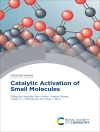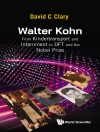Historically the field of heterogeneous catalysis has focused on the design and optimisation of the catalytic materials. However, as these optimisations start to reach diminishing returns, attention has turned to non-conventional means for improving reaction conditions such as the use of ultrasound, plasma, electromagnetic heating and microwave heating. Microwave-assisted catalysis has been demonstrated to be useful in a wide range of applications including ammonia synthesis, desulfurization and production of chemicals from biomass.
Advances in Microwave-assisted Heterogeneous Catalysis begins with the basics of microwave heating and the role of microwaves in heterogeneous catalysis. It goes on to cover the mechanisms of microwave specific reaction rate enhancement, microwave-assisted synthesis of porous, nonporous and supported metal catalysts, microwave augmented reactor technology and microwave-induced catalysis. The application of microwave-assisted heterogeneous catalysis in various fields of energy conversion, environmental remediation, and bulk and specialty chemicals synthesis are also discussed, making this a great reference for anyone involved in catalysis research.
表中的内容
Basics of Microwave Heating and Recent Advances;Role of Microwaves in Heterogeneous Catalysis;Microwave-assisted Synthesis of Nanostructured Oxide Catalysts;Microwave-assisted Synthesis of Porous Materials;Microwave-assisted Reactions with Solid Acid and Base Catalysts;Activation of Stable Molecules by Microwave Catalytic Processing;Microwave-assisted Depolymerization of Polymeric Materials;Microwave-assisted Pyrolysis of Municipal Solid Wastes for Energy, Fuels, and Chemicals Production;Microwave-assisted Catalytic Biodiesel Production;Microwave-augmented Carbon Capture;Microwave-assisted Catalytic Transformation of Biomass to Platform Chemicals;Microwave-assisted Extraction of Lignin from Biomass;Microwave Catalysis in Energy and Environmental Applications;Application of Microwave Irradiation for Fischer–Tropsch Synthesis and Fuel Cells;Microwave-assisted Glycerol Conversion into Valuable Chemicals;Non-uniform Microwave Heating of Heterogeneous Systems: How to Turn Problems into Opportunities;Scale-up of Microwave-assisted Heterogeneous Catalytic Processes
关于作者
Benjaram M. Reddy received the Ph D degree in Catalysis from Osmania University, Hyderabad, India in 1986 and had post-doctoral stints at Institute for Physical Chemistry, Ludwig Maximilian University, Munich, Germany (1988-1989), University at Buffalo, Buffalo, NY (1993-1994), and Texas A&M University, College Station, TX (1994-1995). He began his scientific career as junior scientist in 1984 at CSIR-Indian Institute of Chemical Technology, Hyderabad, where he continued on various capacities namely, Chief Scientist, Head of Department, Distinguished Fellow, and Emeritus Scientist until December 2020. Presently, he is associated with Birla Institute of Technology & Science (BITS) Pilani, Hyderabad Campus as Senior Professor Emeritus. During his long career at CSIR-IICT, he received various fellowships namely, JSPS, DAAD, CNRS, NSF, Brain-pool, and other to visit and work in different countries. He has authored or co-authored 290 original research papers in refereed international journals, 11 book chapters, 12 reviews, 5 monographs and 1 edited book, and holds 8 patents. The h index of his publications now stands at 71 with total citations of more than 15, 800. He has guided 40 Ph D theses and more than 30 BTech/MTech/MSc dissertations. He has been serving as a member of the editorial board or guest editor of Journal of CO2 Utilization, Applied Petrochemical Research, Emission Control Science and Technology, Catalysis Today, Industrial & Engineering Chemistry Research, Frontiers in Chemistry, and some other journals. In his honor, Elsevier Science Publishers’ flagship journal “Molecular Catalysis” published a special issue titled ‘Metal Oxides in Catalysis – Professor Benjaram M Reddy Festschrift’ (Volume 451 in May 2018) on the occasion of his 60th birthday. He has received several awards and honors that include CSIR Young Scientist Award, CSI Young Scientist Award, Associate Fellowship of Third World Academy of Sciences, Sir C V Raman Fellowship of CSIR, Gold Medal of Society for Materials Chemistry (SMC), Bronze Medal of Chemical Research Society of India (CRSI), and many more. He is an elected fellow of Indian National Academy of Engineering, the National Academy of Sciences India, the Royal Society of Chemistry, Andhra Pradesh Academy of Sciences, and Telangana Academy of Sciences. He has served or serving as the council member of International Association of Catalysis Societies (IACS) and Asia-Pacific Association of Catalysis Societies (APACS), honorary secretary of Catalysis Society of India, and honorary treasurer of Telangana Academy of Sciences.












